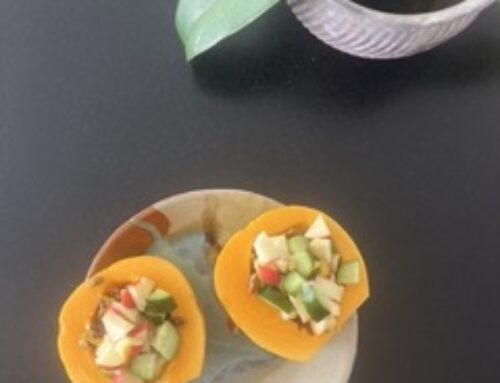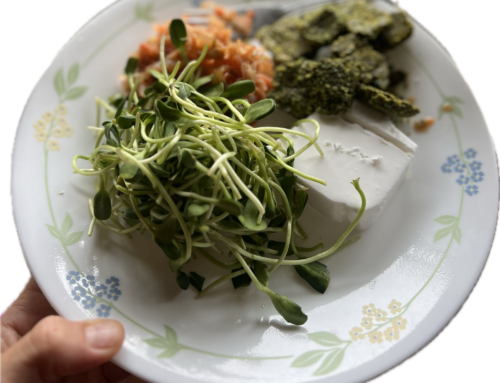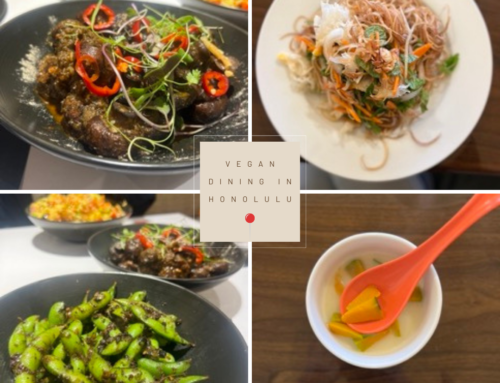-
Sit Down to Eat
How you eat is almost as important as what you eat. Almost. Sitting down to eat eliminates the element of rushing.
Sitting down to eat also implies patience. When we sit, our gesture becomes: despite my hunger, I honor my food and body enough to relish in it, give thanks for it. Catch yourself when you’re in your kitchen and want to snack while you cook. Despite our hunger, nothing honors eating more than pure presence. Sit. -
Eat what’s on your plate

I have re-adopted the principles I learned when I was in recovery almost 20 years ago! They’re essential to having a sound peaceful relationship to food. Here I’m having 2 gluten free cassava/almond based wraps with leftover Okinawa sweet potato and brussel sprouts + hot sauce as well as 2 medium carrots.
Fill your plate or your bowl and eat what’s in/on it. Stop there. While I’m not advocating for the “clean your plate club” what I am suggesting is that putting enough food on your plate is an intention in and of itself. Fill your plate with vegetables, starches, legumes, whole grains, and fruits – add minimal fats (like oils, nuts, seeds and avocado – they’re delicious but we don’t need copious amounts of them like we do veggies and when eaten in excess we render a meal quite caloric). Eat everything and rather than get up for more, pause. You won’t need to snack as much either. Know you’ve eaten enough and treated your body with a gracious helping of food to get you through the next few hours. The best way to ensure you will last the next several hours is to balance your plate with the foods I listed above. One comment I hear often from my friends, family, clients etc is, “that’s so much food! How do you eat so much!?” My answer: Because this is what I eat until my next meal which isn’t for another 4-6 hours. I make sure I fill my stomach so I can last without snacking. I’m never uncomfortably full – that only happens when/if I eat foods high in fat like nuts or oily heavy meals – I don’t like that feeling so I avoid those foods. Volume is what satisfies hunger and our stomachs hold a solid 1.5 liters of food. The only way to do that without gaining weight is to ensure the food is calorically dilute – aka, fruits, vegetables, starches and whole grains. These are foods the body loves and which contain higher water content making it so the body digests them easier too. Make Sense?
-
Eat 3 meals a day
I’m going to piggy back on what I wrote above. Eat 3 meals a day for a while. Nothing more, nothing less. Breakfast is NOT the most important meal of the day – it’s just the meal that breaks your fast between last nights meal and this mornings meal. Use this as an example which is an exerpt from my June 2023 Reset
-
-
- Breakfast: bowl of fruit, honey & flaxmeal
- Lunch: Quart of pureed veggie & white bean soup + crunchy salad & kraut
- Dinner: 1 large sweet potato + stir friend veggies, a bowl of frozen bananas + hemp seeds
-
-

Steamed brussel sprouts with tamari and “nooch” + air friend tofu with chili powder (I also ate it with primal kitchen bbq sauce).
This in and of itself is a cleanse. Eating 3 meals a day trains the body to wait, practice patience and adapt to a balanced schedule of eating. You’ll notice you’re hungry for breakfast, lunch and dinner at appropriate times and your stomach will be more or less emptied by bed time so you’re not going to sleep on a full stomach. Eating three meals a day also ensures that you’re eating – if you come from a background of deprivation or restriction, there is no way you can restrict or deprive yourself of necessary nutrients when you’re eating 3 times a day as long as your meals are balanced (also listed above). I give endless examples of healthy balanced meals so please score my website for visuals and recipes along with my Instagram page. My resets should help too.
I hope this provided you with some helpful guidance. Try them for a week and see/watch/observe what comes up for you. Journal about it. Bring your reflections to your next therapy session.
XO Katie





